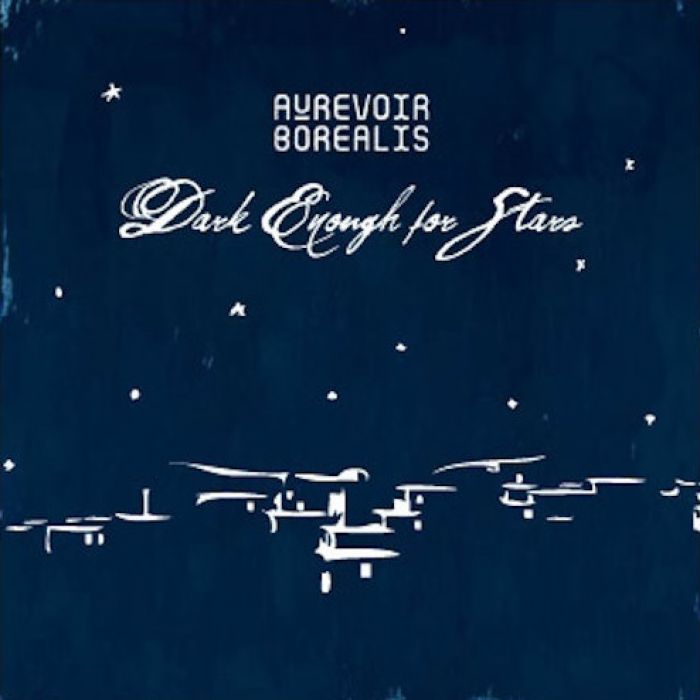Dark Enough for Stars by Au Revoir Borealis (Review)

When it came out that Au Revoir Borealis was working on a new album, I immediately had thoughts that something special was brewing on the horizon. While it had been eight years since their debut, 2000’s Tienken EP, and the bandmembers had since drifted off to various side-projects (e.g., For Wishes, The Great Fiction, and Man’s Last Great Invention), those early songs still stuck with me.
The Tienken EP showed great promise, revealing a band in love with a sound close to my heart while also hinting that Au Revoir Borealis weren’t just interested in a mere genre exercise, but also brought to bear in their music an emotional and spiritual warmth that their peers can often lack.
And now that it’s here, it’s safe to say that Dark Enough for Stars doesn’t really disappoint at all. While the album contains the same love of shoegazer/dream-pop evident in the earlier material, there’s a darker sophistication at work, as one might’ve guessed from the title (itself a play on a Ralph Waldo Emerson quote); there’s a definite melancholy amidst the swirl of sounds that lends itself to a contemplation perfectly suited for this burgeoning autumnal season.
The album begins with one of its strongest tracks. “The Winter Room” quickly establishes the band’s two great strengths: the world-weary vocals of Stephenie McWalters (which are in the same vein as Low’s Mimi Parker) and an almost preternatual control of sonics. As “The Winter Room” unfolds, it does so at solemn, almost wintry (npi) pace, so much so that you can almost see the puffs of breath as McWalters sings:
Cold and remembering
Cold but relenting
Half blind with intention
A tragic invention
Cold but remembering
Meanwhile, Steve Swartz and Tom Currie unleash layer of guitar (16 in all, according to the band’s website) in blizzard-like storms so sharp and beautiful they take your breath away even as they underscore and reinforce the slight thread of hope contained within the lyrics.
“Art Of Film” ventures into similar wintry territory, with amazing and searing guitar dynamics that owe as much to Alan Sparhawk as they do to Neil Halstead. Meanwhile, McWalters sings of cinematic yearnings backed by Swartz and Currie’s haunting vocals.
However, all impressive guitarwork aside, the band proves equally affecting when such things are minimized and stripped away, as they are on “The World Is Too Much With Us” (which just might be my fave track on the album).
Some might call the song plodding, but it’s plodding in the same a Hou Hsiao-Hsien film is plodding. True, the song moves at a glacial pace, but is also full of rich detail, which is especially evident when listening to it on headphones. The layers of female vocals (courtesy of McWalters and Trespassers William’s Anna-Lynne Williams), the softly shimmering guitars, the hum of a Hammond, and the drums’ distant, ominous rumble all come together in a captivating and haunting manner.
Of the album’s twelve tracks, five of them are instrumentals, and it’s here where the album stumbles, if only a bit. Having listened to the album many times, it’s become increasingly apparent that McWalter’s vocals are the heart and soul of the band’s music, grounding the impressive sonic dynamics with a touch of human warmth, longing, and grace. When she’s gone, or subsumed by the band’s more ambient moments, as is the case on “Bella Ballerina” and “Stella, My Brightest Star,” the results may be pretty enough but they do lack a certain “grit” that her vocals bring to the proceedings.
For example, “Stella…” drifts along effortlessy on gauzy layers of guitars, Rhodes piano, and violin, and while there are vocals (courtesy of McWalters and Jessica Bailiff), they’re of the wordless variety. All told, it sounds like a lengthy intro for a Sigur Rós track, one just waiting for Jónsi Birgisson’s falsetto to come floating in.
All of which may sound like an odd critique — until you get to the next track, that is. “The Key” is much more stripped down and less ambient than “Stella…,” but McWalters’ voice (which adopts an almost Celtic lilt at times) and lyrics (which speak of magic and wonder in almost Narnian terms) bring to the track a certain mystique that “Stella…,” for all of its impressive atmospherics, just doesn’t quite achieve.
But this, as I said before, is a minor stumble in an album as rich and rewarding as this one. With Dark Enough for Stars, Au Revoir Borealis have handily transcended the clichés of shoegazer (and slowcore, for that matter), crafting an album rich with emotion and artistry. And one which, if you read the band’s account of the recording process, was fraught with difficulty. As the band puts it on their website:
And so it is that this recording represents our collective joys and sorrows and the things that we have had to overcome to create it. It stands as a marker and as proof that all is not lost and that there is hope in knowing that each day breaks anew — that one can rest in the hope of knowing that in the middle of all darkness, beauty can be found. And that there is a treasure to fight for and hold on to in those stars that pierce through the inky blackness of our longest nights.
It’s a statement that, if you’re prone to cynicism, might seem hopelessly precious… until you actually make your way through Dark Enough for Stars. And then you realize that, not only is such a sentiment truer than true, but that Au Revoir Borealis have created for it a very fitting soundtrack.